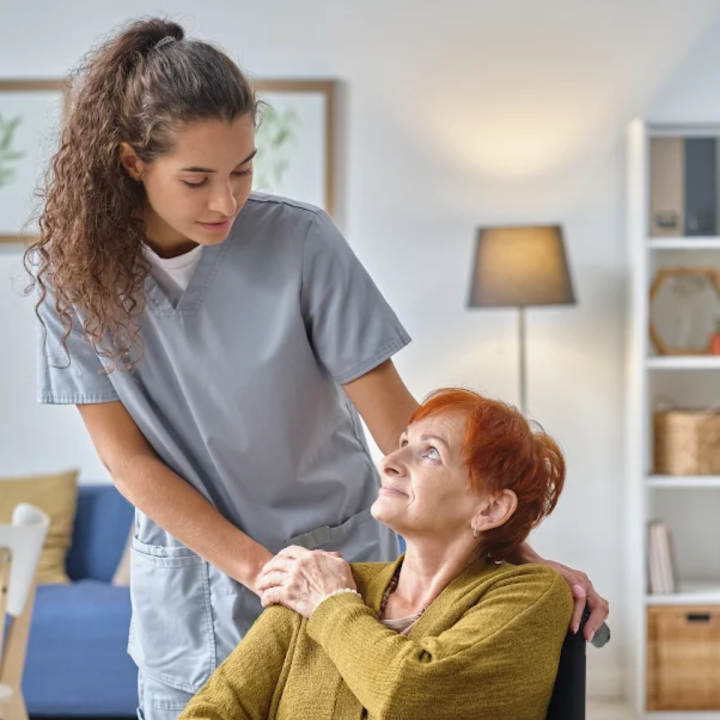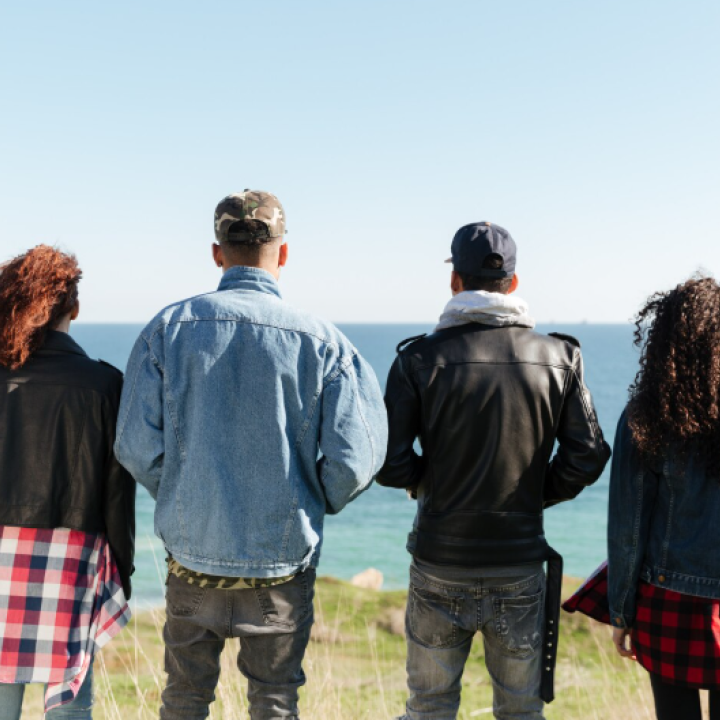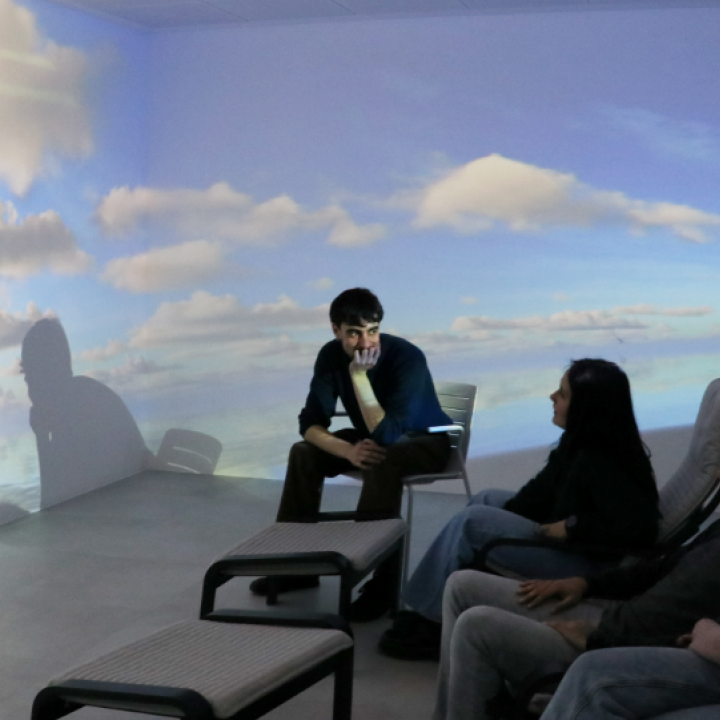Immersive technology is already a reality for mental health care at Suara. The "Resilients" and "Emotio" projects, among other Immersive reality initiatives, are an innovative proposal for the care and well-being of the adolescent and young group.
The World Health Organization (WHO) defines health as a state of physical, social and mental well-being, which is not determined solely by the absence of disease, but also by the promotion of comprehensive health and well-being . In this sense, social entities such as Suara Cooperativa and the biopsychosocial approach, are a commitment to a comprehensive approach in order to prevent and offer therapeutic support for mental health conditions in the population. Especially for the adolescent and young group in a vulnerable situation, which is associated with greater predisposition to suffering mental health problems (1).
Immersive technologies, including Immersive Reality (RI), Virtual Reality (VR) and Augmented Reality (AR), are being incorporated into our daily lives and not only as fun or informative tools, but also as therapeutic interventions and treatments. In recent years, several social and health organizations have begun to integrate immersive technology resources into their professional practice.
Bearing this reality in mind, by this year 2024, at the cooperative we have started collaborations and our own immersive reality projects with three rooms all over Catalonia: one in Olot, one in Barcelona and one in Terres de l'Ebre. In addition, in the province of Girona, we have portable equipment to be able to transfer the immersive experience to many other spaces and territories.
To ensure successful implementation, Suara professionals have been trained in this technology in order to integrate it into the care of people. Currently, 693 professionals have trained in one of the courses offered internally: Immersive training in social care, Mindfulness training with immersive reality level 1 and 2.
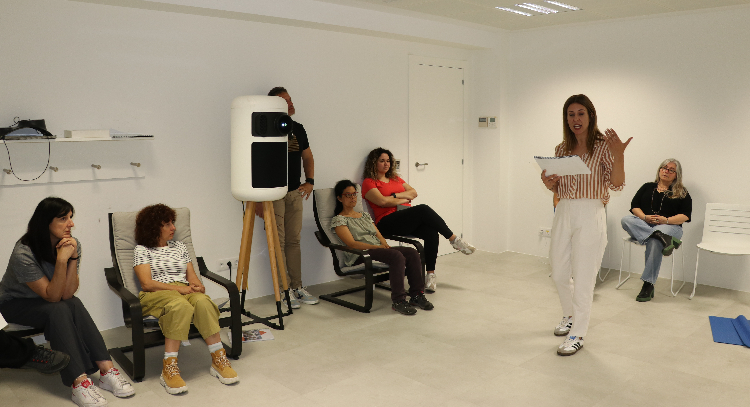
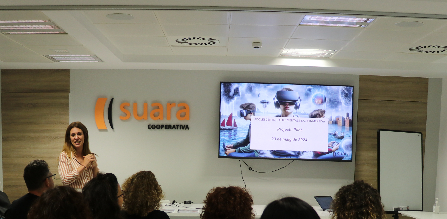
An innovative and social approach
Regarding child and youth care, Suara's Boulding Thought team of mental health experts has designed a project to use the immersive room as a therapeutic support tool for adolescents and youth. It is an attractive proposal for teenagers and young people because it is a program that tunes in to the digital language of our young people and could improve adherence to psychosocial support and accompaniment processes, among other issues, "due to the fact that many institutionalized young people, they don't trust mental health services and it takes a lot for them to open up to receiving help and support with conventional treatments" Jèssica Andreu, director of UEC Cambrils and responsible for Building thought.
Paradigm change: adolescence an opportunity
El projecte neix de l’experiència dels professionals que acompanyen l’adolescència a Suara i les darreres evidències en neurociències, que aposten per un canvi de paradigma sobre aquesta etapa vital. Considerada de vulnerabilitat i crisi, ara l’adolescència és vista com un període d’oportunitats per fer canvis en el funcionament cerebral i modular conductes més adaptatives. Doncs, biològicament, aquesta etapa evolutiva, suposa per a l’adolescent un cert “caos cerebral”, ja que es troba construint noves connexions neuronals, aquelles que seran útils per afrontar els reptes de l’adultesa, i desapareixent aquelles connexions que ja no li resulten útils per afrontar les etapes posteriors. El que s’anomena “la poda sinàptica”.
Donada aquesta capacitat de plasticitat del cervell, es possibilita la reparació de conductes desadaptatives fruit de contextos de maltractament i l’enfortiment de vincles amb adults referents positius.
Promoting Links
Immersive technology makes it possible to create shared experiences between teenagers and peer adults that would otherwise be impossible. For example, young people can virtually expose themselves to a space or image that connects it to personal experiences: a storm, a fire, walking through a crowd of people, their high school or visiting their birthplace, in a context therapeutic and with a trusted professional who makes them feel safe and secure to be able to face their migration grief process, trauma or mental health condition.
These experiences are not only rewarding, but also strengthen the bond and allow what is called "anchoring" to the treatment and relationship with the adult, facilitating a space for meeting and connection.
Validation and pilot testing
The project is advanced and a pilot test is starting. An essay that will allow us to test the program, create more audiovisual content aimed at and created by the young people themselves, obtain data on its effectiveness and be able to draw conclusions.
So, in September 2024, he launched the project in Barcelona under the name "Resilients" thanks to the subsidy of the 2nd Call of the HISS. Specifically, it will be possible to test it with users of the Post-Acompanya'm project and/or young people with mental health problems.
The Emotio project is also being launched in the province of Girona, through funding obtained from CONVO 2024. In this case, a trial will be carried out with 200 young people in the territory for prevention and support in mental health. In the first phase of this pilot test, the aim will be to assess whether the use of the room implies benefits in the mental health of young people.
A living project
The project is a living tool in which all Suara professionals can participate in its growth. For this reason, two improvements are being worked on: program and application design with group modality and the construction of a resource repository accessible to professionals who use the tool. The aim is for it to be a tool at the service of professionals to improve social care, expanding and redefining it and from daily practice its use and application.
The mental and emotional health of adolescents and young people is an issue that requires a collective commitment. The entities of the third sector are key agents in this approach, but it is essential that the whole of society is involved in raising awareness and promoting a supportive environment.
Jèssica Andreu, director of UEC Cambrils and responsible for Mental Health Building thought.
z
- Saraceno B. Herder, Barcelona: 2018. Discurso global, sufrimientos locales. Análisis crítico del Movimiento por la Salud Mental Global.
- Leiva-Peña V, Rubí-González P, Vicente-Parada B. Determinantes sociales de la salud mental: políticas públicas desde el modelo biopsicosocial en países latinoamericanos [Social Determinants of Mental Health: Public Policies Based on the Biopsychosocial Model in Latin American CountriesDeterminantes sociais da saúde mental: políticas públicas a partir do modelo biopsicossocial em países latino-americanos]. Rev Panam Salud Publica. 2021 Dec 16;45:e158. Spanish. doi: 10.26633/RPSP.2021.158. PMID: 34934419; PMCID: PMC8678097.


